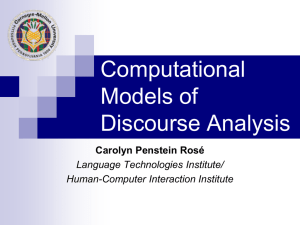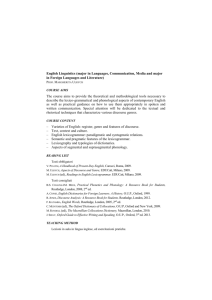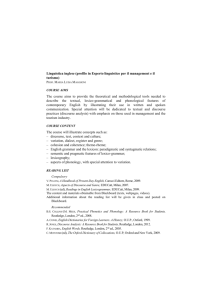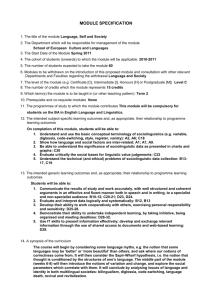Sociolinguistics (LG 252)
advertisement
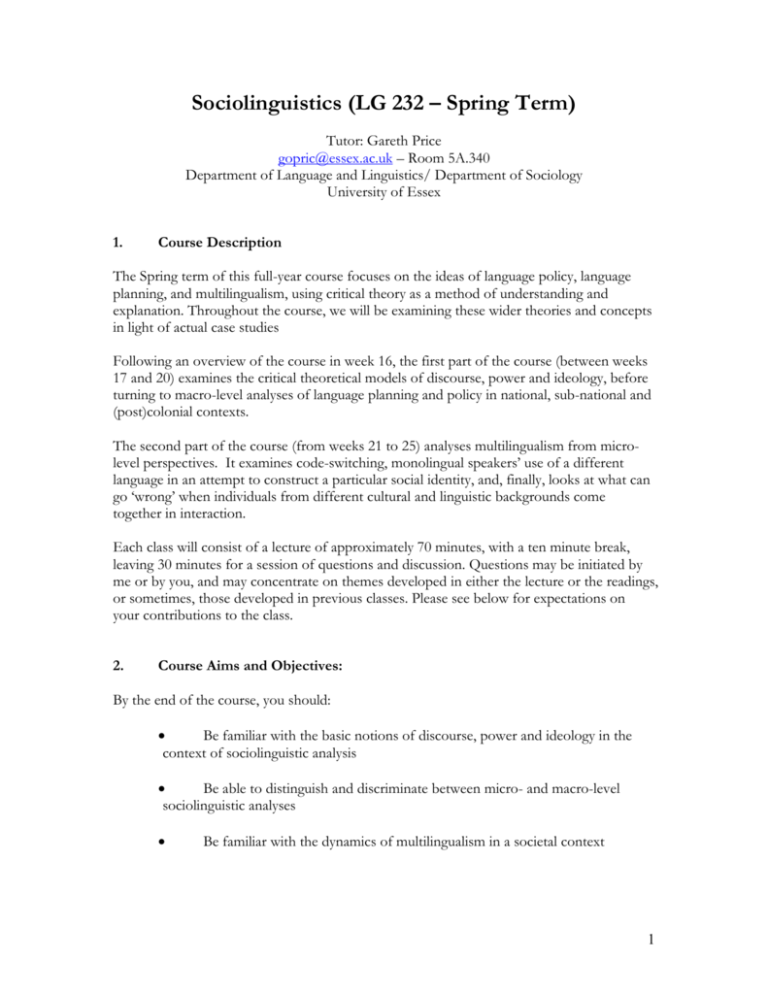
Sociolinguistics (LG 232 – Spring Term) Tutor: Gareth Price gopric@essex.ac.uk – Room 5A.340 Department of Language and Linguistics/ Department of Sociology University of Essex 1. Course Description The Spring term of this full-year course focuses on the ideas of language policy, language planning, and multilingualism, using critical theory as a method of understanding and explanation. Throughout the course, we will be examining these wider theories and concepts in light of actual case studies Following an overview of the course in week 16, the first part of the course (between weeks 17 and 20) examines the critical theoretical models of discourse, power and ideology, before turning to macro-level analyses of language planning and policy in national, sub-national and (post)colonial contexts. The second part of the course (from weeks 21 to 25) analyses multilingualism from microlevel perspectives. It examines code-switching, monolingual speakers’ use of a different language in an attempt to construct a particular social identity, and, finally, looks at what can go ‘wrong’ when individuals from different cultural and linguistic backgrounds come together in interaction. Each class will consist of a lecture of approximately 70 minutes, with a ten minute break, leaving 30 minutes for a session of questions and discussion. Questions may be initiated by me or by you, and may concentrate on themes developed in either the lecture or the readings, or sometimes, those developed in previous classes. Please see below for expectations on your contributions to the class. 2. Course Aims and Objectives: By the end of the course, you should: Be familiar with the basic notions of discourse, power and ideology in the context of sociolinguistic analysis Be able to distinguish and discriminate between micro- and macro-level sociolinguistic analyses Be familiar with the dynamics of multilingualism in a societal context 1 3. Assessment The course is assessed by: 1 x 3000 word essay (due April 21st 2008 – Monday, Week 30) a) and b) 1 x 3 hour examination (dates to be confirmed) Essay titles will be given to you in Week 18. A revision class will be held at the beginning of the Summer term in preparation for the exam. 4. Attendance and Class Contribution Weekly attendance records will be kept and attendance is compulsory. Absences – unless in an emergency – must be notified by email in advance. Repeated non-attendance without valid reasons may jeopardize your place on the course. You will not be formally assessed on your contributions in class; however, in order to maximize your learning experience, you are strongly advised to come to class prepared by following the readings and being ready to engage in debate and discussion. You may be called upon at any time to answer questions about the readings or the lecture, and you are invited to propose your own. 5. Weekly Readings At minimum, you should have read all of the required reading; ideally you should have attempted some or all of the suggested readings for each week. Most of the readings are short and written in an accessible style, but you are not expected to understand everything you read on the first attempt, nor are you expected to have memorized the readings – they will link into what is being discussed in class. It is hoped that you will spend approximately one and a half hours per week for required readings; additional reading may take longer. You will not be formally assessed on the amount of reading you do. However, to write your essays and pass the exams, you will need to have completed, at the very least, the required readings and the more of the supplementary readings you complete, the better chance you have of securing a higher grade. For this reason, keeping up to date with your reading is important, as it means you will understand more of what is going on in class and also avoid having a pile of reading to do when you are trying to revise. It will also help for revision if you keep a photocopy of the readings. If you require further reading material on a particular topic you are interested in, perhaps for exam preparation or for your essays, please contact me either by email or during my office hours. 2 6. Office Hours Office hours will be on Tuesdays from 1.30 – 2.30, and from 1.30 – 2.30 on Fridays, in room 5A.340 (in the Sociology Department, two floors above the Linguistics Department. Other times may be available. I can always be contacted on email: gopric@essex.ac.uk 7. Course Outline Week 16: Multilingualism, Language Policy, and Critical Theory: An Introduction This is an introductory session which will go over the general aims of the course, and what you are expected to contribute, and achieve. The main thematic focus of the course will be introduced, including the concepts of language policy and planning, multilingualism, nationalism and globalization, the notion of ‘critical’ theory, and the differences between micro- and macro-level analyses. Required Reading: Begin reading for week 17 onwards. Week 17: Three Critical Approaches: Discourse, Power and Ideology Taken together, these three concepts from critical theory provide us with a theoretical framework for analyzing language and politics from a sociolinguistic perspective. This session will provide a general introduction to the main points of these theories, and they will be practically applied to examples of actual language situations throughout the rest of the course. Required Reading Barker, C. (2000) : Cultural Studies: Theory and Practice (Sage: London) ‘Althusser and Ideology’ pp.56 – 63 and ‘Foucault: Discourse, Practice and Power’ pp.77 – 81 Sarup, M. (1993) : An Introductory Guide to Post-Structuralism and Postmodernism (Harvester Wheatsheaf: London) ‘Power & Knowledge’ pp. 73 – 75 and ‘Foucault and Althusser’ pp.75 – 78 Suggested Reading Fairclough, N. (2001): ‘Introduction: Critical Language Study’ in Language and Power (Pearson: London) pp. 1 – 14 Tollefson, J. (2006) ‘Critical Theory in Language Policy’ in Ricento, T. (ed.) An Introduction to Language Policy: Theory and Method (Blackwell: Oxford) pp. 43- 59 3 Week 18: Societies One Language, One Nation? Language Policies in Multilingual One of the key ways in which language is overtly politicised is when governments, at the national level, decide which languages are to be used, and where, in society. The modern nation state has tended to privilege one language as the national language as a component of national unity, but is that realistic in a world where most, if not all, countries are to some extent multilingual? This session provides an overview of diglossia, multilingualism, and current – critical – approaches to the study of language policy. Required Reading: Hornberger, N. (2006) ‘Frameworks and Models in Language Policy and Planning’ in Ricento, T. (ed.) An Introduction to Language Policy: Theory and Method (Blackwell: Oxford) pp. 25 – 41 Wright, S. Language Policy and Language Planning: from Nationalism to Globalisation (Palgrave Macmillan: Basingstoke) Chapter 2 Ferguson, C. (2000) ‘Diglossia’ in Wei, L. (ed.) The Bilngualism Reader (Routledge: London) pp 65 - 81 Suggested Reading: Blommaert and Verschuren (1998): ‘The Role of Language in European Nationalist Ideologies.’ (Ch. 9) in Schieffelin et al (eds.) Language Ideologies: Practice and Theory (Oxford: Oxford University Press) Wright, S. Language Policy and Language Planning: from Nationalism to Globalisation (Palgrave Macmillan: Basingstoke) Chapter 3 Week 19: Does Language Policy Do Exactly What It Says On The Tin? Some Perspectives on Language Planning Language planning can be understood as putting policy into practice, but it does not necessarily follow that all language planning is carried out by governments at the national level, or that policies at the national level are implemented at the local level in precisely the way they were intended. Here, we look at some case studies of the ways in which language policies are actually carried out, and whether policies actually work. What problems occur when policies are put into practice? How do individuals or groups resist language policies that they may not agree with, or alternatively, formulate and pursue their own policies? Can language policies unintentionally create inequalities which they set out to reduce? Required Reading Tollefson, J. (1991) Planning Language, Planning Inequality (London: Longman) Chapter 3 and Chapter 5 4 Suggested Reading: Sonntag, S. (1995) ‘Elite Competition and Official Language Movements’ in Tollefson, J. (ed.) Power and Inequality in Language Education (Cambridge: Cambridge University Press) Week 20: ‘Killer languages?’: Linguistic Imperialism, Language Death, or New Languages? Languages can decline or even ‘die’ when they are put into competition with other languages – such as English – which people choose to learn or speak because there are social or economic reasons to do so. Sometimes this occurs because of colonization: where a foreign language becomes an option because of the physical presence of speakers of another language in a country. Often, it becomes a choice without anyone invading a particular country. On the other hand, a ‘new’ language can be appropriated by a local community, and rather than the original language dying, the new language can be used to produce hybridized varieties of the old - and even new languages – in the forms of pidgins and creoles. This session looks at some of these issues. Required Reading Mesthrie, R et al. (2000) Introducing Sociolinguistics (Edinburgh, University Press) Chapter 8 Romaine, S. (1994) Language and Society (Oxford: Oxford University Press) pp 1 – 11; 32 – 44; 49 – 54; Kachru, B (1995) ‘The Alchemy of English’ in Ashcroft et al (eds.) The Postcolonial Studies Reader (London: Routledge) pp. 291 – 295 Suggested Reading: Mesthrie, R et al. (2000) Introducing Sociolinguistics (Edinburgh, University Press) Chapter 9 Phillipson, R. (1992) Linguistic Imperialism (Oxford: Oxford University Press) Chapters 1 - 4 Skuttnab-Kangas, T. (2000) Linguistic Genocide in Education – or Worldwide Diversity and Human Rights? (Mahwah, NJ: Lawrence Erlbaum) Chapter 6 Week 21 Political Discourse Analysis: The Language of Politics and the Media We have so far looked at the politics of language: how governments or local groups negotiate and contest the relative status of different languages. In this session, we invert that logic somewhat, by examining the how individual politicians and newspapers use particular 5 forms of language – different dialects, styles, registers and sometimes, even different languages – for political reasons. This session builds upon the notion of ‘discourse’ by introducing critical discourse analysis as a means to understand language practices. Required Reading: Chilton, P. (2004) Analysing Political Discourse: Theory and Practice (Abingdon: Routledge) Chapters 1, 2 & 7 Suggested Reading: Fairclough, N. (2001): Language and Power (Pearson: London) Chapter 7 Week 22: Reading Week (no class) Week 23: Bilingualism and Code-Switching Following on from the last session, we continue to look at the way individuals, rather than governments or institutions, use language in multilingual situations. For bilinguals, more than one language may be used in the same conversation or interaction. This is known as 'code-switching.' In this session, we look at how, why, and where this phenomenon can (and, also, cannot) occur. Required Reading: Romaine, S. (1989) Bilingualism (London: Blackwell) Chapters 1 & 4 Suggested Reading: Poplack, S. (2000) ‘Sometimes I’ll start a sentence in Spanish y termino en Espanol.’ In Wei, L (ed.) The Bilngualism Reader (Routledge: London) pp 221 - 257 Week 24: Code-switching, and Crossing 'Crossing' is a similar phenomenon to code-switching, but it often involves non-bilingual speakers using or appropriating someone else’s language to perform a different social or cultural identity to the one normally used by the speaker. In this class, we look at how, when and why these phenomena happen. Required Reading Rampton, B.(1998) 'Language crossing and the redefinition of reality' in Codeswitching in Conversation (ed. P. Auer), pp.290-317 London: Routledge 6 Sebba, M. (in press): ‘Identity and language construction in an online community: the case of Ali G.’ In Auer, P. and Kallmeyer, W. (eds.) Social identity and communicative styles. An alternative approach to variability in language. (Berlin: Mouton/de Gruyter) Suggested Reading: Cutler, C. (1999). ‘Yorkville crossing: white teens, hip hop and African American English’ Journal of Sociolinguistics 3/4, 428-442 Week 25: Intercultural (Mis) Communication In interactions between people from different cultural and linguistic backgrounds, things can sometimes go ‘wrong.’ Misunderstandings can occur due to cultural or linguistic differences, and when misunderstanding occur as a result of both, interactions can become difficult. Required Reading: Price, G. (2004) East is East: Stereotype and Prejudice in Intercultural (Mis)Communication Unpublished MA paper, University of Essex (available from me) Young, L. (1982) ‘Inscrutability Revisited.’ In Gumperz, J. (ed.) Language and Social Identity (Cambridge: Cambridge University Press) pp 72 – 85 Suggested Reading: Jupp, T.C. et al (1982) ‘Language and Disadvantage: the Hidden Process.’ In Gumperz, J. (ed.) Language and Social Identity (Cambridge: Cambridge University Press) pp 232 – 256 7
